Instructions 1 Please use only C as the language of programm
Instructions:
1. Please use only C as the language of programming.
2. Please submit the following: (1) the client and the server source files each (2) a brief Readme le that shows the usage of the program.
3. Please appropriately comment your program and name all the identifiers suitable, to enable enhanced readability of the code.
Problem:
develop a Web server that also responds with the file contents
upon being contacted by the client. Your simple Web server would be capable of processing only one
request. Specifically, your Web server will (i) create a connection socket when contacted by a client (a
web browser); (ii) receive the HTTP request from this connection (read the http command sequences,
discussed in class); (iii) parse the request to determine the specific file being requested; (iv) get the
requested file from the server\'s file system, restricted to local directory; (v) create an HTTP response
message consisting of the requested file preceded by header lines; and (vi) send the response over the
TCP connection to the requesting browser. If a browser requests a file that is not present in your server,
your server should return a 404 Not Found error message. Your job is to complete the code, run your server, and then
test your server by sending requests from browsers. Use the port no other than 80 if you run your server
on a host that already has a Web server running on it.
Solution
#include <sys/socket.h> /* socket definitions */
#include <sys/types.h> /* socket types */
#include <sys/wait.h> /* for waitpid() */
#include <arpa/inet.h> /* inet (3) funtions */
#include <stdio.h>
#include <stdlib.h>
#include \"helper.h\"
#include \"servreq.h\"
#define SERVER_PORT (8080)
/* main() funcion */
int main(int argc, char *argv[]) {
int listener, conn;
pid_t pid;
struct sockaddr_in servaddr;
/* Create socket */
if ( (listener = socket(AF_INET, SOCK_STREAM, 0)) < 0 )
Error_Quit(\"Couldn\'t create listening socket.\");
/* Populate socket address structure */
memset(&servaddr, 0, sizeof(servaddr));
servaddr.sin_family = AF_INET;
servaddr.sin_addr.s_addr = htonl(INADDR_ANY);
servaddr.sin_port = htons(SERVER_PORT);
/* Assign socket address to socket */
if ( bind(listener, (struct sockaddr *) &servaddr, sizeof(servaddr)) < 0 )
Error_Quit(\"Couldn\'t bind listening socket.\");
/* Make socket a listening socket */
if ( listen(listener, LISTENQ) < 0 )
Error_Quit(\"Call to listen failed.\");
/* Loop infinitely to accept and service connections */
while ( 1 ) {
/* Wait for connection */
if ( (conn = accept(listener, NULL, NULL)) < 0 )
Error_Quit(\"Error calling accept()\");
/* Fork child process to service connection */
if ( (pid = fork()) == 0 ) {
/* This is now the forked child process, so
close listening socket and service request */
if ( close(listener) < 0 )
Error_Quit(\"Error closing listening socket in child.\");
Service_Request(conn);
/* Close connected socket and exit */
if ( close(conn) < 0 )
Error_Quit(\"Error closing connection socket.\");
exit(EXIT_SUCCESS);
}
/* If we get here, we are still in the parent process,
so close the connected socket, clean up child processes,
and go back to accept a new connection. */
if ( close(conn) < 0 )
Error_Quit(\"Error closing connection socket in parent.\");
waitpid(-1, NULL, WNOHANG);
}
return EXIT_FAILURE; /* We shouldn\'t get here */
}
servreq.h
/*
Interface to function to server connections.
*/
#ifndef PG_SERVREQ_H
#define PG_SERVREQ_H
/* Function prototypes */
int Service_Request(int conn);
#endif /* PG_SERVREQ_H */
servreq.c
/*
Implementation of function to service requests.
*/
#include <stdio.h>
#include <errno.h>
#include \"helper.h\"
#include \"reqhead.h\"
#include \"resphead.h\"
#include \"resource.h\"
/* Service an HTTP request */
int Service_Request(int conn) {
struct ReqInfo reqinfo;
int resource = 0;
InitReqInfo(&reqinfo);
/* Get HTTP request */
if ( Get_Request(conn, &reqinfo) < 0 )
return -1;
/* Check whether resource exists, whether we have permission
to access it, and update status code accordingly. */
if ( reqinfo.status == 200 )
if ( (resource = Check_Resource(&reqinfo)) < 0 ) {
if ( errno == EACCES )
reqinfo.status = 401;
else
reqinfo.status = 404;
}
/* Output HTTP response headers if we have a full request */
if ( reqinfo.type == FULL )
Output_HTTP_Headers(conn, &reqinfo);
/* Service the HTTP request */
if ( reqinfo.status == 200 ) {
if ( Return_Resource(conn, resource, &reqinfo) )
Error_Quit(\"Something wrong returning resource.\");
}
else
Return_Error_Msg(conn, &reqinfo);
if ( resource > 0 )
if ( close(resource) < 0 )
Error_Quit(\"Error closing resource.\");
FreeReqInfo(&reqinfo);
return 0;
}
reqhead.h
/*
Interface to functions for manipulating HTTP request headers.
*/
#ifndef PG_REQHEAD_H
#define PG_REQHEAD_H
/* User-defined data types */
enum Req_Method { GET, HEAD, UNSUPPORTED };
enum Req_Type { SIMPLE, FULL };
struct ReqInfo {
enum Req_Method method;
enum Req_Type type;
char *referer;
char *useragent;
char *resource;
int status;
};
/* Global macros/variables */
#define MAX_REQ_LINE (1024)
/* Function prototypes */
int Parse_HTTP_Header(char * buffer, struct ReqInfo * reqinfo);
int Get_Request (int conn, struct ReqInfo * reqinfo);
void InitReqInfo (struct ReqInfo * reqinfo);
void FreeReqInfo (struct ReqInfo * reqinfo);
#endif /* PG_REQHEAD_H */
reqhead.c
/*
Implementation of functions to manipulate HTTP request headers.
*/
#include <sys/time.h> /* For select() */
#include <stdlib.h>
#include <string.h>
#include <ctype.h>
#include \"reqhead.h\"
#include \"servreq.h\"
#include \"helper.h\"
/* Parses a string and updates a request
information structure if necessary. */
int Parse_HTTP_Header(char * buffer, struct ReqInfo * reqinfo) {
static int first_header = 1;
char *temp;
char *endptr;
int len;
if ( first_header == 1 ) {
/* If first_header is 0, this is the first line of
the HTTP request, so this should be the request line. */
/* Get the request method, which is case-sensitive. This
version of the server only supports the GET and HEAD
request methods. */
if ( !strncmp(buffer, \"GET \", 4) ) {
reqinfo->method = GET;
buffer += 4;
}
else if ( !strncmp(buffer, \"HEAD \", 5) ) {
reqinfo->method = HEAD;
buffer += 5;
}
else {
reqinfo->method = UNSUPPORTED;
reqinfo->status = 501;
return -1;
}
/* Skip to start of resource */
while ( *buffer && isspace(*buffer) )
buffer++;
/* Calculate string length of resource... */
endptr = strchr(buffer, \' \');
if ( endptr == NULL )
len = strlen(buffer);
else
len = endptr - buffer;
if ( len == 0 ) {
reqinfo->status = 400;
return -1;
}
/* ...and store it in the request information structure. */
reqinfo->resource = calloc(len + 1, sizeof(char));
strncpy(reqinfo->resource, buffer, len);
/* Test to see if we have any HTTP version information.
If there isn\'t, this is a simple HTTP request, and we
should not try to read any more headers. For simplicity,
we don\'t bother checking the validity of the HTTP version
information supplied - we just assume that if it is
supplied, then it\'s a full request. */
if ( strstr(buffer, \"HTTP/\") )
reqinfo->type = FULL;
else
reqinfo->type = SIMPLE;
first_header = 0;
return 0;
}
/* If we get here, we have further headers aside from the
request line to parse, so this is a \"full\" HTTP request. */
/* HTTP field names are case-insensitive, so make an
upper-case copy of the field name to aid comparison.
We need to make a copy of the header up until the colon.
If there is no colon, we return a status code of 400
(bad request) and terminate the connection. Note that
HTTP/1.0 allows (but discourages) headers to span multiple
lines if the following lines start with a space or a
tab. For simplicity, we do not allow this here. */
endptr = strchr(buffer, \':\');
if ( endptr == NULL ) {
reqinfo->status = 400;
return -1;
}
temp = calloc( (endptr - buffer) + 1, sizeof(char) );
strncpy(temp, buffer, (endptr - buffer));
StrUpper(temp);
/* Increment buffer so that it now points to the value.
If there is no value, just return. */
buffer = endptr + 1;
while ( *buffer && isspace(*buffer) )
++buffer;
if ( *buffer == \'\\0\' )
return 0;
/* Now update the request information structure with the
appropriate field value. */
if ( !strcmp(temp, \"USER-AGENT\") ) {
reqinfo->useragent = malloc( strlen(buffer) + 1 );
strcpy(reqinfo->useragent, buffer);
}
else if ( !strcmp(temp, \"REFERER\") ) {
reqinfo->referer = malloc( strlen(buffer) + 1 );
strcpy(reqinfo->referer, buffer);
}
free(temp);
return 0;
}
/* Gets request headers. A CRLF terminates a HTTP header line,
but if one is never sent we would wait forever. Therefore,
we use select() to set a maximum length of time we will
wait for the next complete header. If we timeout before
this is received, we terminate the connection. */
int Get_Request(int conn, struct ReqInfo * reqinfo) {
char buffer[MAX_REQ_LINE] = {0};
int rval;
fd_set fds;
struct timeval tv;
/* Set timeout to 5 seconds */
tv.tv_sec = 5;
tv.tv_usec = 0;
/* Loop through request headers. If we have a simple request,
then we will loop only once. Otherwise, we will loop until
we receive a blank line which signifies the end of the headers,
or until select() times out, whichever is sooner. */
do {
/* Reset file descriptor set */
FD_ZERO(&fds);
FD_SET (conn, &fds);
/* Wait until the timeout to see if input is ready */
rval = select(conn + 1, &fds, NULL, NULL, &tv);
/* Take appropriate action based on return from select() */
if ( rval < 0 ) {
Error_Quit(\"Error calling select() in get_request()\");
}
else if ( rval == 0 ) {
/* input not ready after timeout */
return -1;
}
else {
/* We have an input line waiting, so retrieve it */
Readline(conn, buffer, MAX_REQ_LINE - 1);
Trim(buffer);
if ( buffer[0] == \'\\0\' )
break;
if ( Parse_HTTP_Header(buffer, reqinfo) )
break;
}
} while ( reqinfo->type != SIMPLE );
return 0;
}
/* Initialises a request information structure */
void InitReqInfo(struct ReqInfo * reqinfo) {
reqinfo->useragent = NULL;
reqinfo->referer = NULL;
reqinfo->resource = NULL;
reqinfo->method = UNSUPPORTED;
reqinfo->status = 200;
}
/* Frees memory allocated for a request information structure */
void FreeReqInfo(struct ReqInfo * reqinfo) {
if ( reqinfo->useragent )
free(reqinfo->useragent);
if ( reqinfo->referer )
free(reqinfo->referer);
if ( reqinfo->resource )
free(reqinfo->resource);
}
resphead.h
/*
Interface to HTTP response header functions
*/
#ifndef PG_RESPHEAD_H
#define PG_RESPHEAD_H
#include \"reqhead.h\" /* for struct ReqInfo */
/* Function prototypes */
int Output_HTTP_Headers(int conn, struct ReqInfo * reqinfo);
#endif /* PG_RESPHEAD_H */
resphead.c
/*
Implementation of HTTP reponse header functions.
*/
#include <unistd.h>
#include <stdio.h>
#include \"resphead.h\"
#include \"helper.h\"
/* Outputs HTTP response headers */
int Output_HTTP_Headers(int conn, struct ReqInfo * reqinfo) {
char buffer[100];
sprintf(buffer, \"HTTP/1.0 %d OK\ \ \", reqinfo->status);
Writeline(conn, buffer, strlen(buffer));
Writeline(conn, \"Server: PGWebServ v0.1\ \ \", 24);
Writeline(conn, \"Content-Type: text/html\ \ \", 25);
Writeline(conn, \"\ \ \", 2);
return 0;
}
resource.h
/*
Interface to functions for returning a resource.
*/
#ifndef PG_RESOURCE_H
#define PG_RESOURCE_H
#include \"reqhead.h\" /* for struct ReqInfo */
/* Function prototypes */
int Return_Resource (int conn, int resource, struct ReqInfo * reqinfo);
int Check_Resource (struct ReqInfo * reqinfo);
int Return_Error_Msg(int conn, struct ReqInfo * reqinfo);
#endif /* PG_RESOURCE_H */
resource.c
/*
Implementation of functions for returning a resource.
*/
#include <unistd.h>
#include <fcntl.h>
#include <string.h>
#include <stdio.h>
#include \"resource.h\"
#include \"reqhead.h\"
#include \"helper.h\"
/* Change this string to change the root directory that
the server will use */
static char server_root[1000] = \"/home/httpd/html\";
/* Returns a resource */
int Return_Resource(int conn, int resource, struct ReqInfo * reqinfo) {
char c;
int i;
while ( (i = read(resource, &c, 1)) ) {
if ( i < 0 )
Error_Quit(\"Error reading from file.\");
if ( write(conn, &c, 1) < 1 )
Error_Quit(\"Error sending file.\");
}
return 0;
}
/* Tries to open a resource. The calling function can use
the return value to check for success, and then examine
errno to determine the cause of failure if neceesary. */
int Check_Resource(struct ReqInfo * reqinfo) {
/* Resource name can contain urlencoded
data, so clean it up just in case. */
CleanURL(reqinfo->resource);
/* Concatenate resource name to server root, and try to open */
strcat(server_root, reqinfo->resource);
return open(server_root, O_RDONLY);
}
/* Returns an error message */
int Return_Error_Msg(int conn, struct ReqInfo * reqinfo) {
char buffer[100];
sprintf(buffer, \"<HTML>\ <HEAD>\ <TITLE>Server Error %d</TITLE>\ \"
\"</HEAD>\ \ \", reqinfo->status);
Writeline(conn, buffer, strlen(buffer));
sprintf(buffer, \"<BODY>\ <H1>Server Error %d</H1>\ \", reqinfo->status);
Writeline(conn, buffer, strlen(buffer));
sprintf(buffer, \"<P>The request could not be completed.</P>\ \"
\"</BODY>\ </HTML>\ \");
Writeline(conn, buffer, strlen(buffer));
return 0;
}
helper.h
/*
Interface to helper functions for simple webserver.
*/
#ifndef PG_HELPER_H
#define PG_HELPER_H
#include <unistd.h> /* for ssize_t data type */
/* Function prototypes */
void Error_Quit(char const * msg);
int Trim (char * buffer);
int StrUpper (char * buffer);
void CleanURL (char * buffer);
ssize_t Readline (int sockd, void *vptr, size_t maxlen);
ssize_t Writeline (int sockd, const void *vptr, size_t n);
/* Global macros/variables */
#define LISTENQ (1024)
#endif /* PG_HELPER_H */
helper.c
/*
Implementation of helper functions for simple web server.
*/
#include <stdlib.h>
#include <stdio.h>
#include <errno.h>
#include <ctype.h>
#include \"helper.h\"
/* Prints an error message and quits */
void Error_Quit(char const * msg) {
fprintf(stderr, \"WEBSERV: %s\ \", msg);
exit(EXIT_FAILURE);
}
/* Read a line from a socket */
ssize_t Readline(int sockd, void *vptr, size_t maxlen) {
ssize_t n, rc;
char c, *buffer;
buffer = vptr;
for ( n = 1; n < maxlen; n++ ) {
if ( (rc = read(sockd, &c, 1)) == 1 ) {
*buffer++ = c;
if ( c == \'\ \' )
break;
}
else if ( rc == 0 ) {
if ( n == 1 )
return 0;
else
break;
}
else {
if ( errno == EINTR )
continue;
Error_Quit(\"Error in Readline()\");
}
}
*buffer = 0;
return n;
}
/* Write a line to a socket */
ssize_t Writeline(int sockd, const void *vptr, size_t n) {
size_t nleft;
ssize_t nwritten;
const char *buffer;
buffer = vptr;
nleft = n;
while ( nleft > 0 ) {
if ( (nwritten = write(sockd, buffer, nleft)) <= 0 ) {
if ( errno == EINTR )
nwritten = 0;
else
Error_Quit(\"Error in Writeline()\");
}
nleft -= nwritten;
buffer += nwritten;
}
return n;
}
/* Removes trailing whitespace from a string */
int Trim(char * buffer) {
int n = strlen(buffer) - 1;
while ( !isalnum(buffer[n]) && n >= 0 )
buffer[n--] = \'\\0\';
return 0;
}
/* Converts a string to upper-case */
int StrUpper(char * buffer) {
while ( *buffer ) {
*buffer = toupper(*buffer);
++buffer;
}
return 0;
}
/* Cleans up url-encoded string */
void CleanURL(char * buffer) {
char asciinum[3] = {0};
int i = 0, c;
while ( buffer[i] ) {
if ( buffer[i] == \'+\' )
buffer[i] = \' \';
else if ( buffer[i] == \'%\' ) {
asciinum[0] = buffer[i+1];
asciinum[1] = buffer[i+2];
buffer[i] = strtol(asciinum, NULL, 16);
c = i+1;
do {
buffer[c] = buffer[c+2];
} while ( buffer[2+(c++)] );
}
++i;
}
}
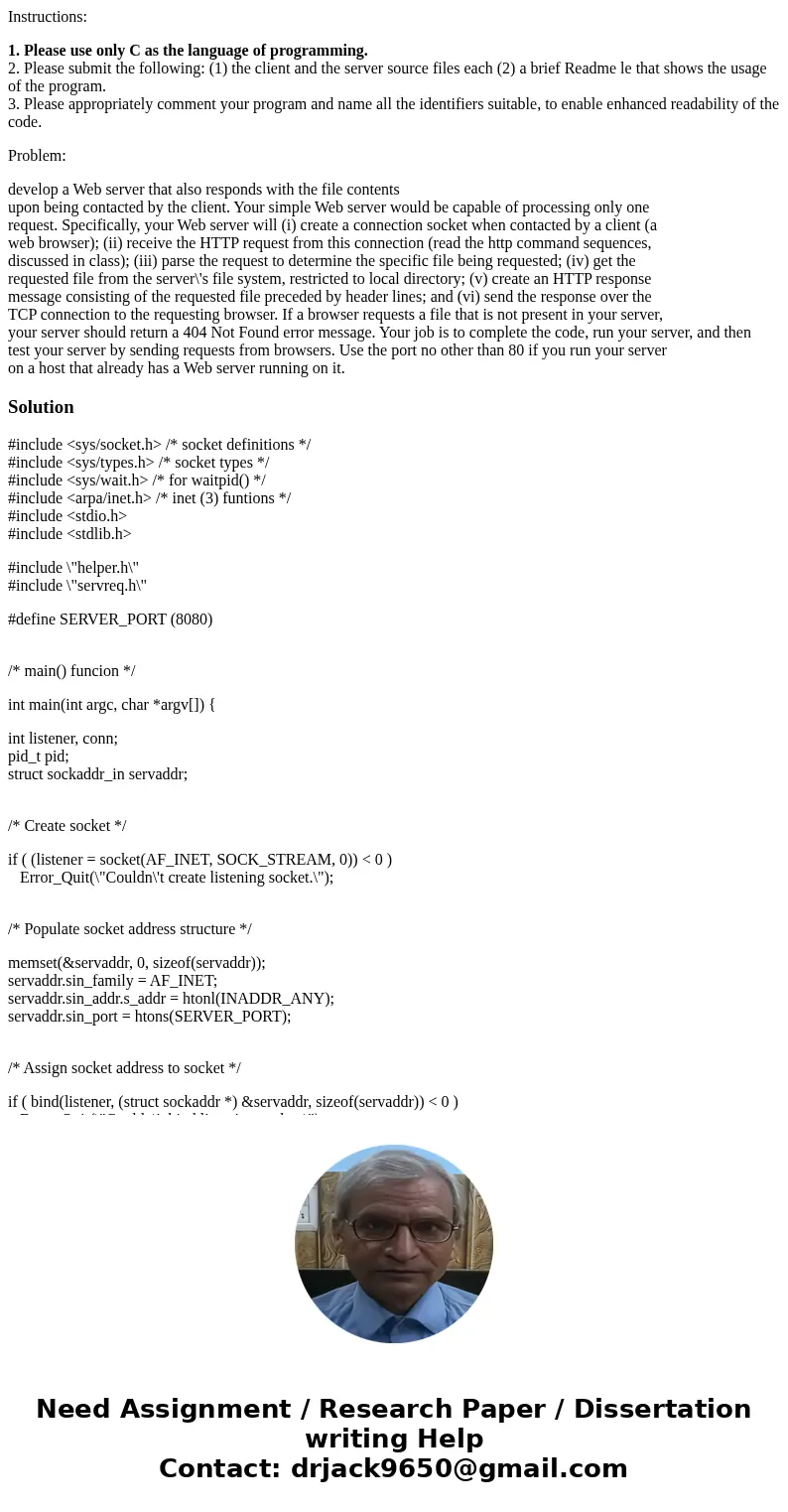
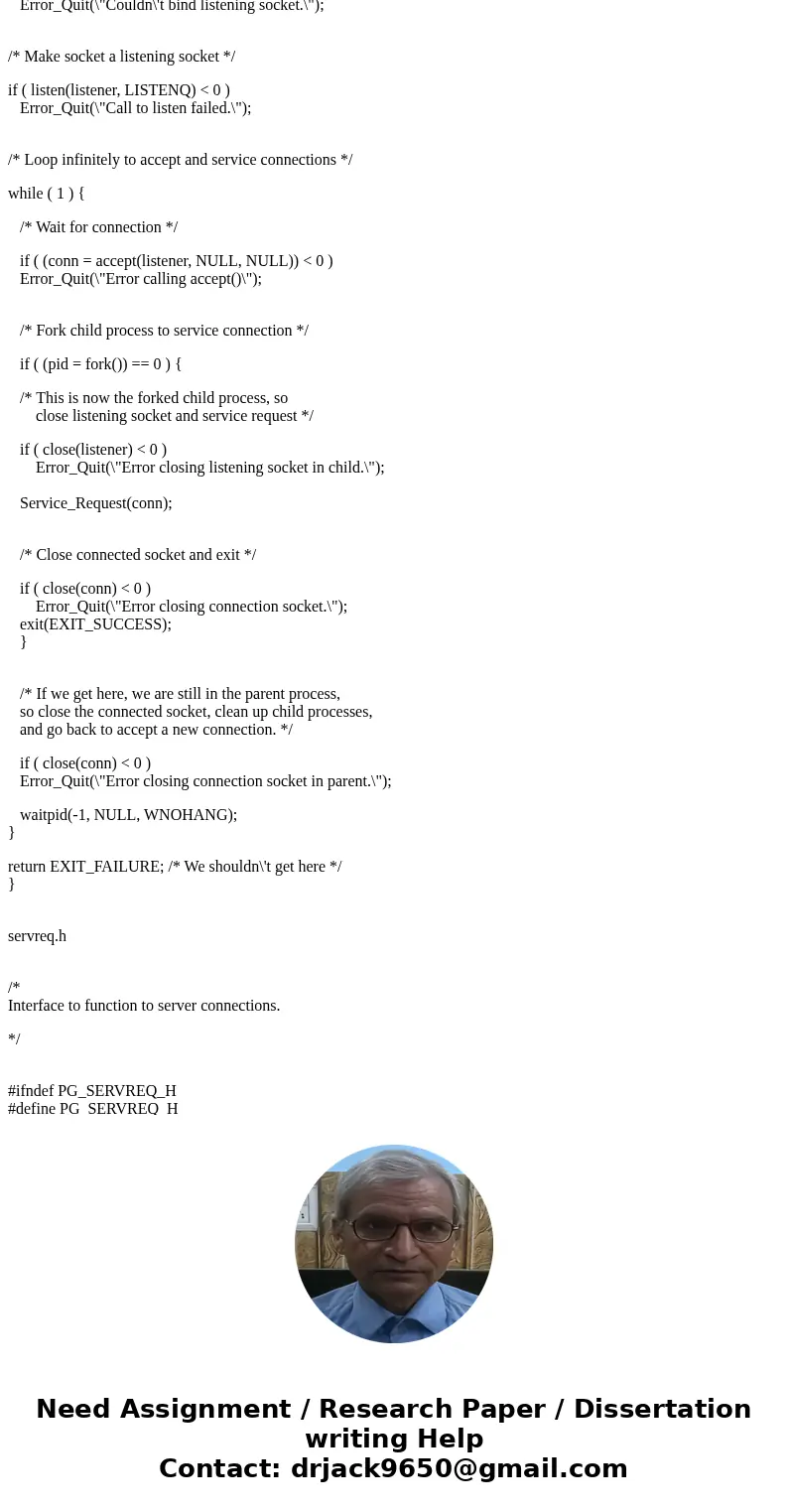

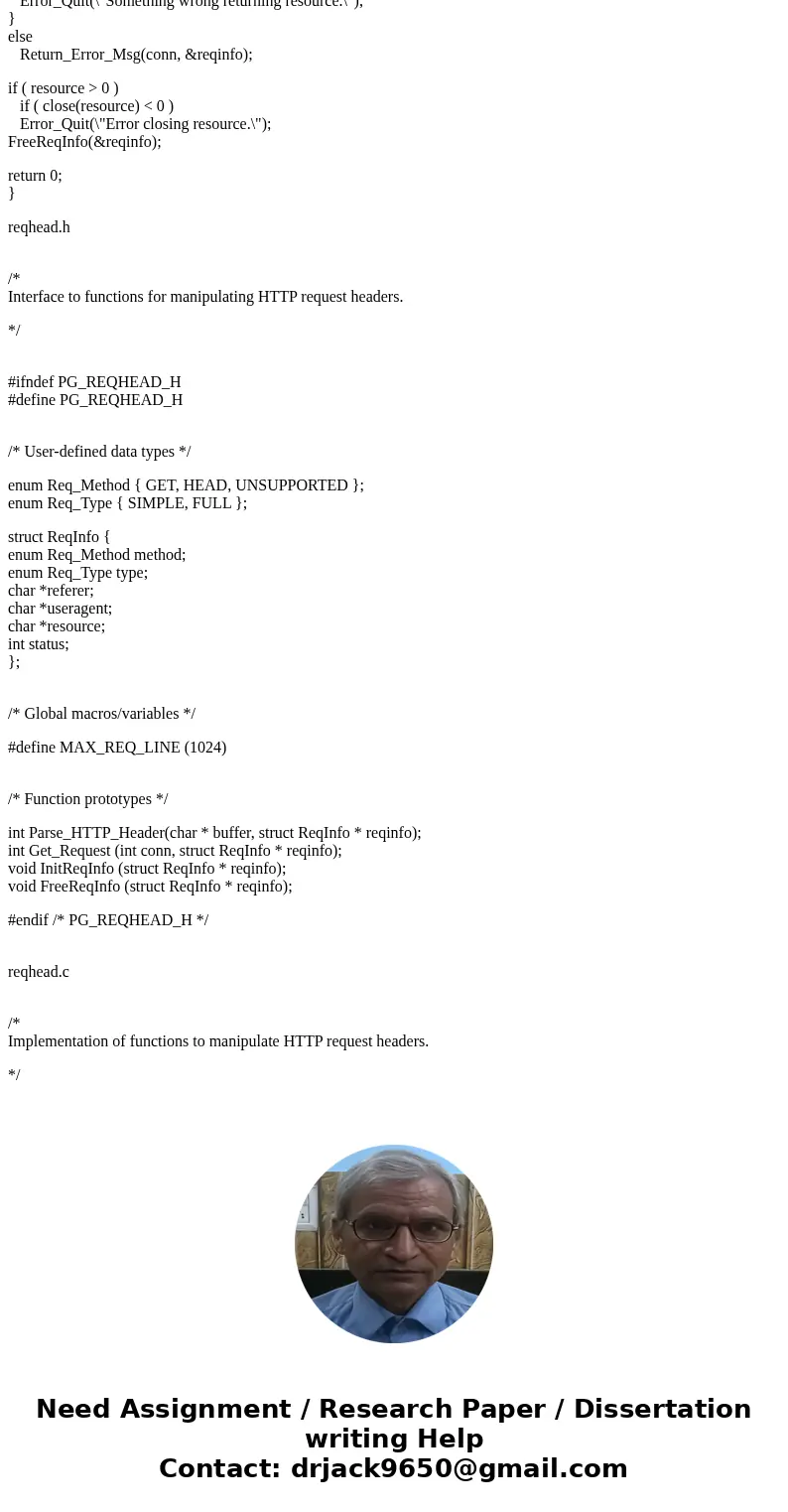
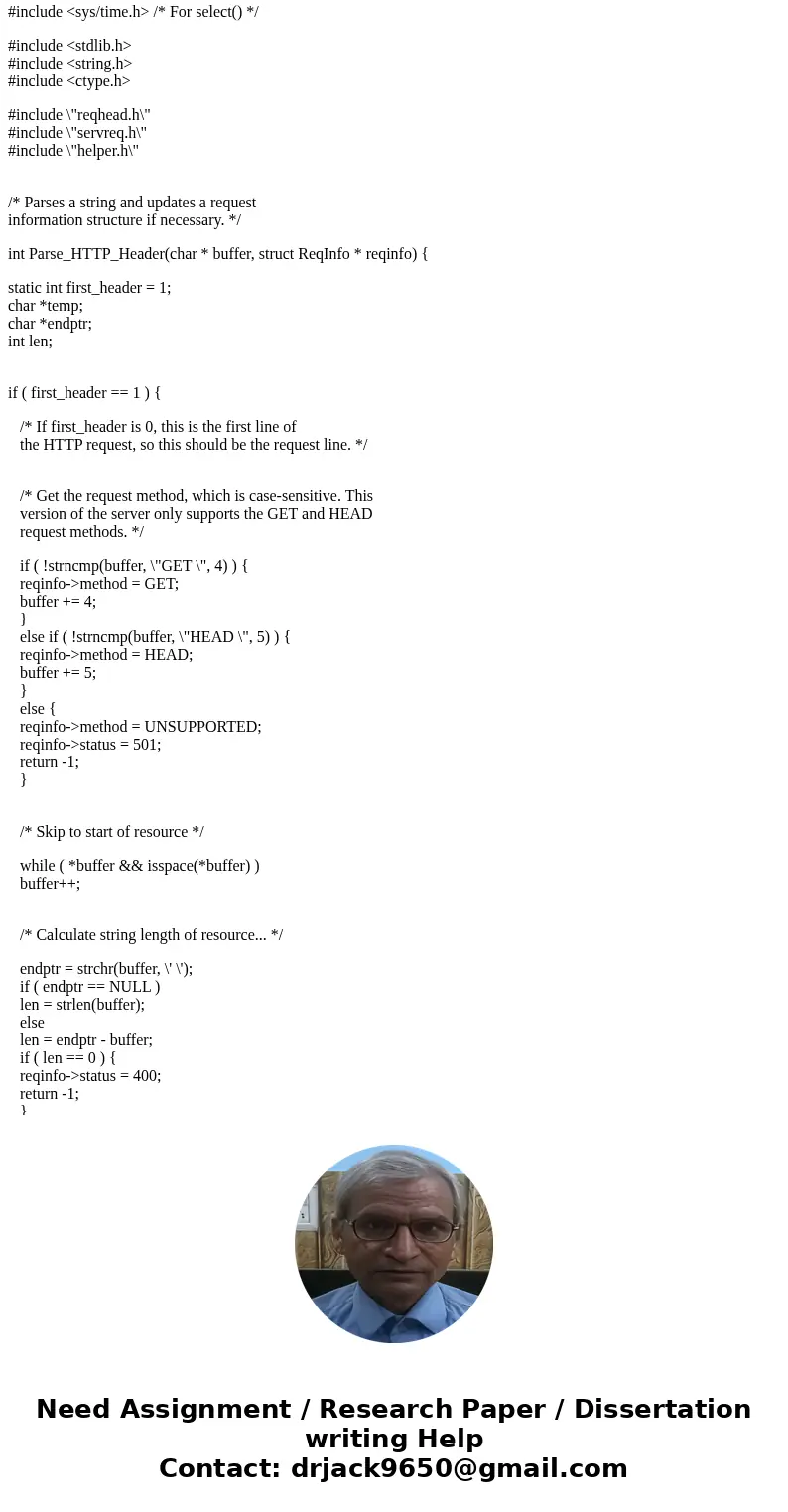
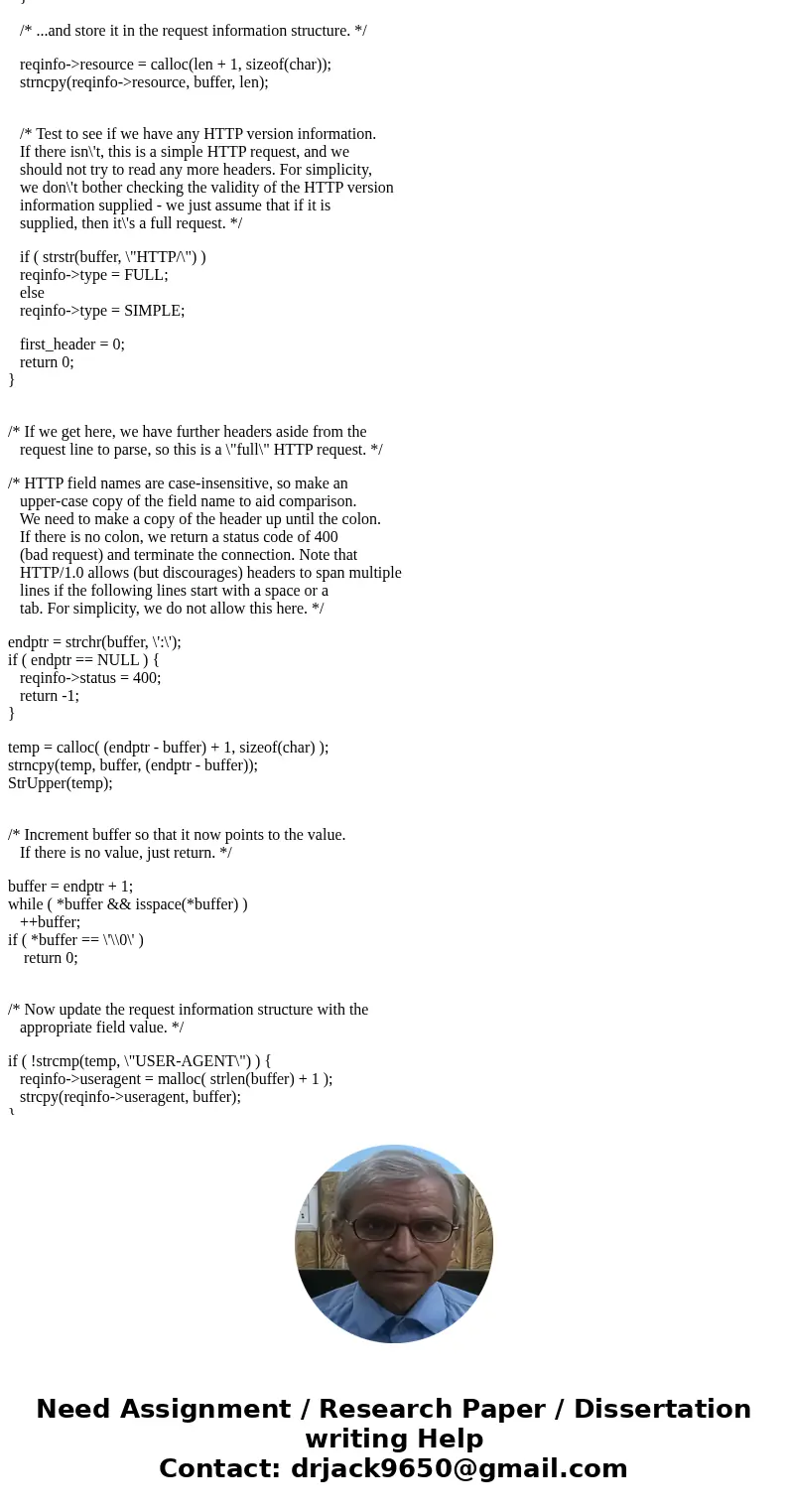
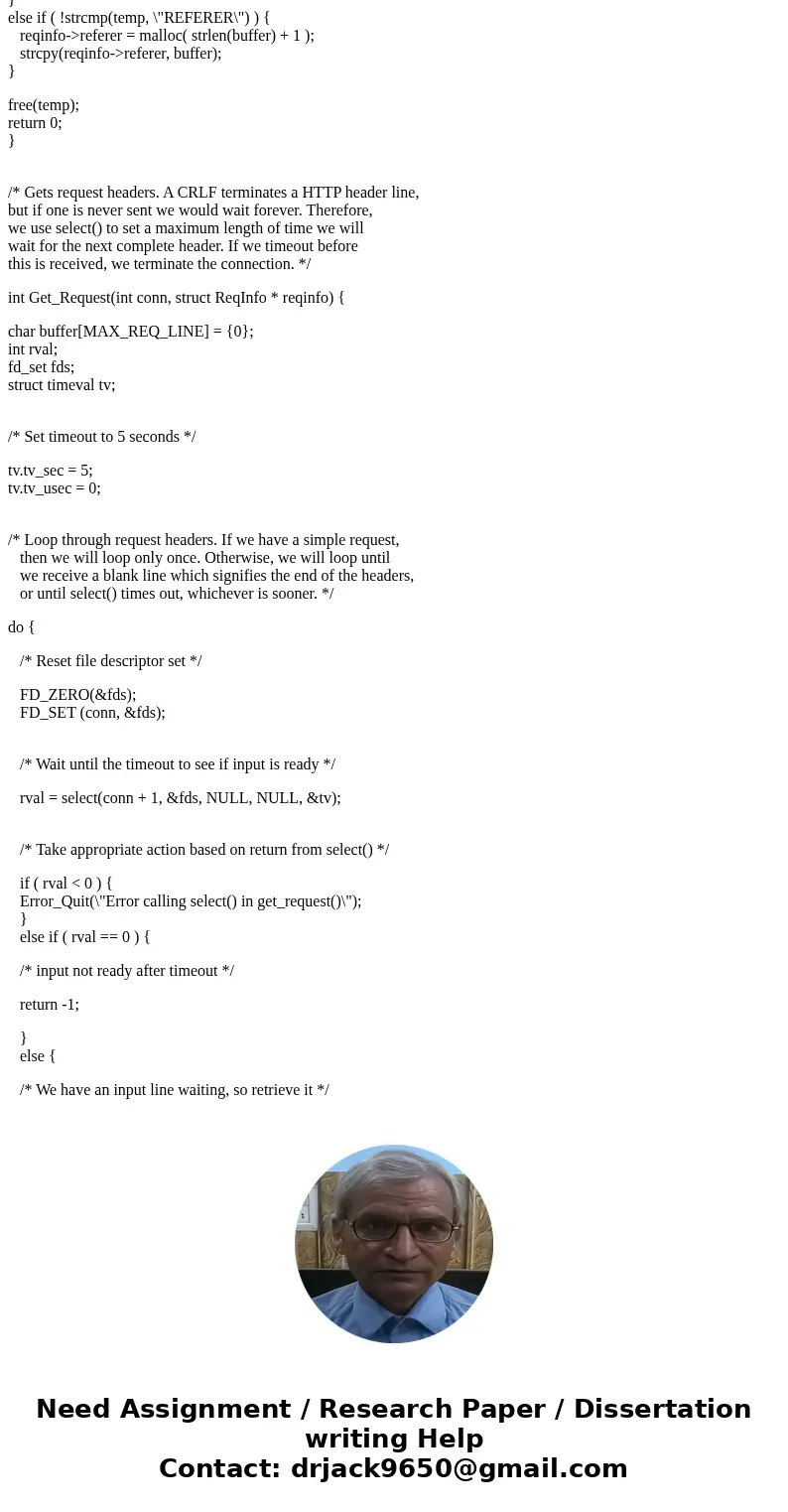
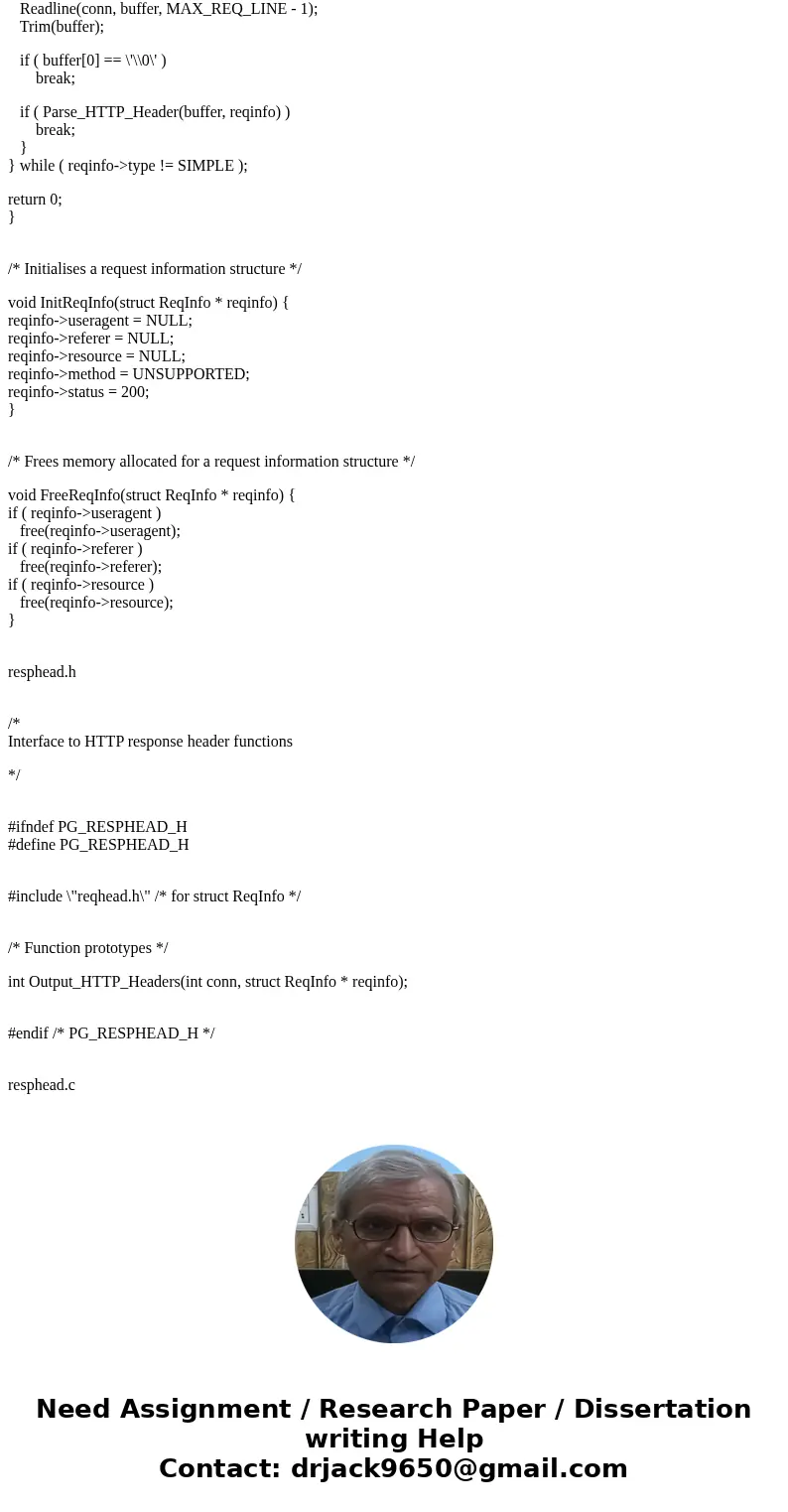

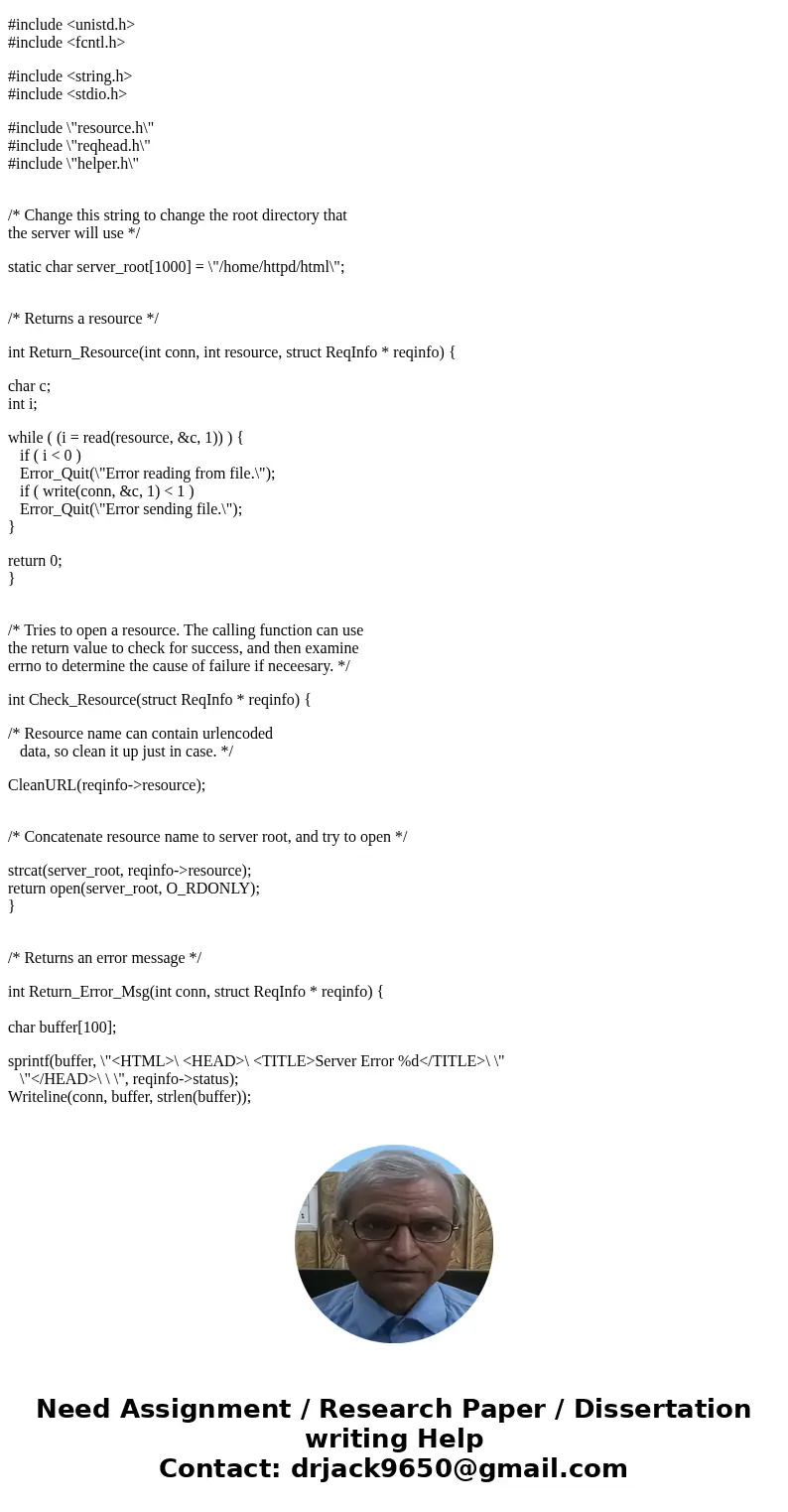

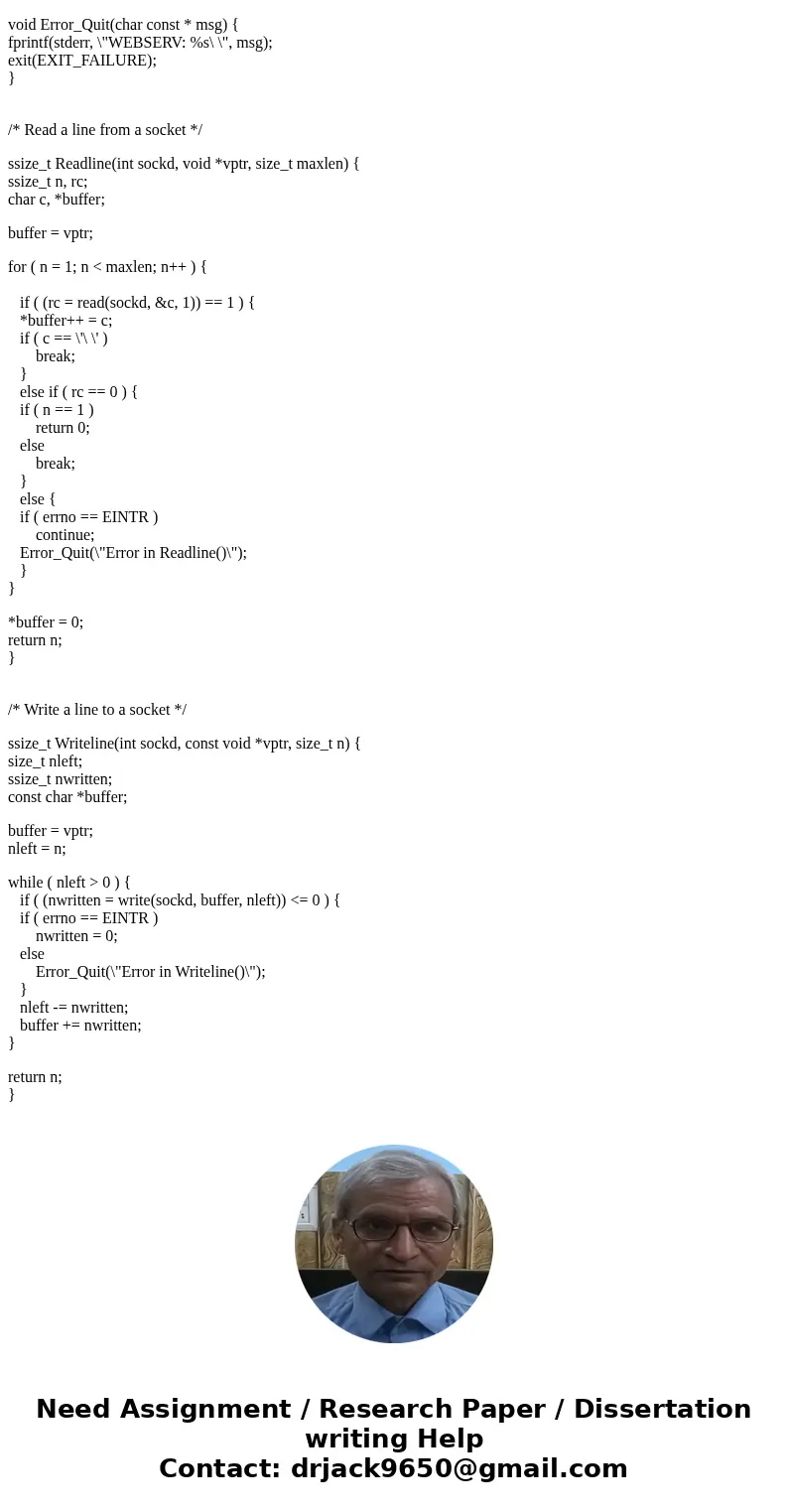

 Homework Sourse
Homework Sourse